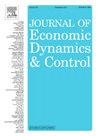Learning to bet (rationally) with logs
IF 2.3
3区 经济学
Q2 ECONOMICS
引用次数: 0
Abstract
In an economy with uncertainty and asymmetric information, suppose that some agents learn the relation between fundamentals and prices by observing past market outcomes. They refine their understanding as they become more experienced, but their past “errors” contaminate the information they receive. Does this process converge to the “perfect” understanding of the market that underlies rational expectation equilibria? We address this question in a simplified setting that allows for explicit computation of the learning process: a two-state economy with logarithmic utilities and no background risk. Our first result is that as long as the wealth of the uninformed agents is less than half the aggregate wealth of the economy, the learning process indeed converges to rational expectations. This convergence, however, is non-monotonic, and the market oscillates between phases of excess price volatility and phases of excess volume of trade. The learning process, in addition, is costly for the uninformed agents. We interpret our results as underscoring the fragility of ree: markets operate orderly only when speculation is less significant than fundamental trade.
学会用原木(理性地)打赌
在一个具有不确定性和信息不对称的经济中,假设一些代理人通过观察过去的市场结果了解了基本面和价格之间的关系。当他们变得更有经验时,他们会完善自己的理解,但他们过去的“错误”会污染他们接收到的信息。这个过程是否会收敛到对市场的“完美”理解,即理性预期均衡的基础?我们在一个简化的设置中解决了这个问题,该设置允许对学习过程进行明确的计算:一个具有对数效用且没有背景风险的两态经济。我们的第一个结果是,只要不知情的代理人的财富小于经济总财富的一半,学习过程确实收敛于理性预期。然而,这种收敛不是单调的,市场在价格过度波动的阶段和贸易量过剩的阶段之间振荡。此外,对于不知情的代理来说,学习过程是昂贵的。我们认为,我们的研究结果突显了自由市场的脆弱性:只有当投机的重要性低于基本面交易时,市场才会有序运行。
本文章由计算机程序翻译,如有差异,请以英文原文为准。
求助全文
约1分钟内获得全文
求助全文
来源期刊

Journal of Economic Dynamics & Control
ECONOMICS-
CiteScore
3.10
自引率
10.50%
发文量
199
期刊介绍:
The journal provides an outlet for publication of research concerning all theoretical and empirical aspects of economic dynamics and control as well as the development and use of computational methods in economics and finance. Contributions regarding computational methods may include, but are not restricted to, artificial intelligence, databases, decision support systems, genetic algorithms, modelling languages, neural networks, numerical algorithms for optimization, control and equilibria, parallel computing and qualitative reasoning.
 求助内容:
求助内容: 应助结果提醒方式:
应助结果提醒方式:


